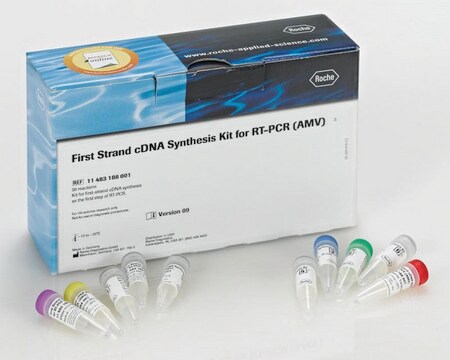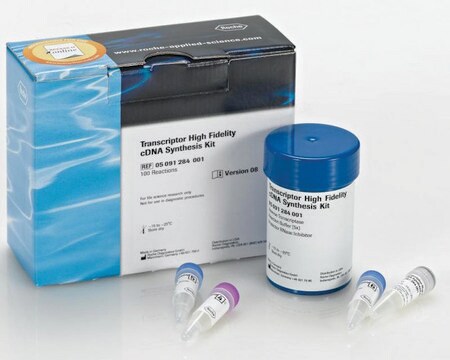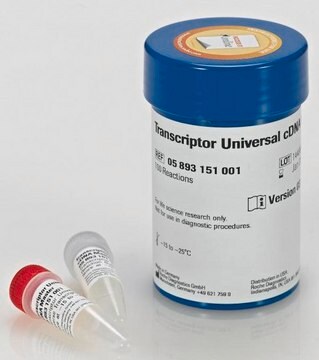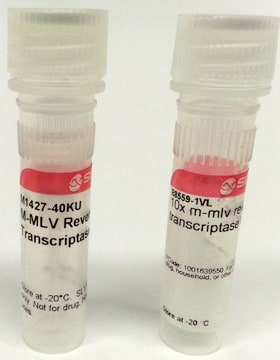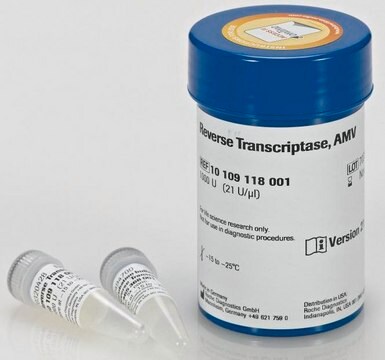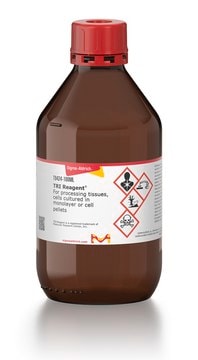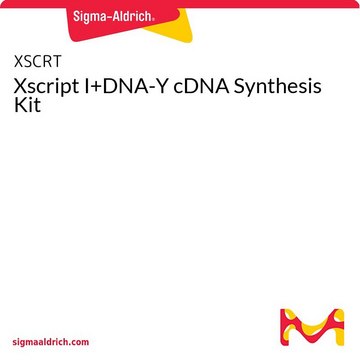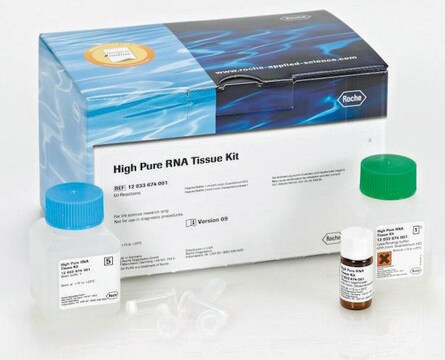추천 제품
제조업체/상표
Cytiva 27-9261-01
색상
colorless
배송 상태
dry ice
저장 온도
−20°C
일반 설명
Designed to generate full-length first-strand cDNA from mRNA templates. Following first-strand cDNA synthesis, the sample can be used directly for in vitro amplification using PCR or for second-strand synthesis using the Gubler-Hoffman method.
First-Strand cDNA Synthesis Kit is designed to generate full-length first-strand cDNA from mRNA templates. Following first-strand cDNA synthesis, the sample can be used directly for in vitro amplification using PCR or for second-strand synthesis using the Gubler-Hoffman method. Primers are not included in the preassembled First-Strand Reaction Mixes, thus allowing use of a primer of choice. Two primers are included with the kit. pd(N)6 Primer (random hexamer) is used to prepare libraries for screening with antibodies, to increase the representation of 5′-ends of mRNAs having significant secondary structure, or to copy mRNAs lacking a poly(A) tail.
The NotI-(dT)18 Bifunctional Primer can be used to prime selectively on mRNA that has a poly(A) tail. It can also be used as a PCR primer following first-strand synthesis. The NotI restriction site, located at the 5′-end of the primer, is particularly useful for subsequent directional cloning of cDNA and PCR products.
First-Strand cDNA Synthesis Kit contains the following reagents, sufficient for up to 55 first-strand syntheses, each of which will produce enough material for up to 15 amplification reactions: Bulk First-Strand cDNA Reaction Mixes, mRNA Standard, DTT Solution, RNase-Free Water, pd(N)6 Primer, NotI-(dT)18 Bifunctional Primer, and instruction booklet.
First-Strand cDNA Synthesis Kit is designed to generate full-length first-strand cDNA from mRNA templates. Following first-strand cDNA synthesis, the sample can be used directly for in vitro amplification using PCR or for second-strand synthesis using the Gubler-Hoffman method. Primers are not included in the preassembled First-Strand Reaction Mixes, thus allowing use of a primer of choice. Two primers are included with the kit. pd(N)6 Primer (random hexamer) is used to prepare libraries for screening with antibodies, to increase the representation of 5′-ends of mRNAs having significant secondary structure, or to copy mRNAs lacking a poly(A) tail.
The NotI-(dT)18 Bifunctional Primer can be used to prime selectively on mRNA that has a poly(A) tail. It can also be used as a PCR primer following first-strand synthesis. The NotI restriction site, located at the 5′-end of the primer, is particularly useful for subsequent directional cloning of cDNA and PCR products.
First-Strand cDNA Synthesis Kit contains the following reagents, sufficient for up to 55 first-strand syntheses, each of which will produce enough material for up to 15 amplification reactions: Bulk First-Strand cDNA Reaction Mixes, mRNA Standard, DTT Solution, RNase-Free Water, pd(N)6 Primer, NotI-(dT)18 Bifunctional Primer, and instruction booklet.
애플리케이션
First-strand cDNA synthesis kit has been used to reverse transcribe total RNA into cDNA.
특징 및 장점
- For synthesis of single-stranded cDNA prior to amplification by PCR.
- Features preassembled bulk reaction mixes to save time and minimize potential for pipetting errors.
- Allows users to choose primers.
- Includes a choice of two primers: pd(N)6 random hexamers and NotI-(dT)18.
저장 및 안정성
Please be aware this product may be shipped 90 days before the expiration date. For more information on the batch specific expiration date, please contact technical service.
분석 메모
To view the Certificate of Analysis for this product, please visit www.cytiva.com.
Storage Class Code
12 - Non Combustible Liquids
시험 성적서(COA)
제품의 로트/배치 번호를 입력하여 시험 성적서(COA)을 검색하십시오. 로트 및 배치 번호는 제품 라벨에 있는 ‘로트’ 또는 ‘배치’라는 용어 뒤에서 찾을 수 있습니다.
이미 열람한 고객
Registered report: A coding-independent function of gene and pseudogene mRNAs regulates tumour biology
Israr Khan
eLife (2015)
Replication Study: BET bromodomain inhibition as a therapeutic strategy to target c-Myc
Fraser Aird
eLife (2017)
Juan José Fung et al.
eLife, 4 (2015-09-04)
The Reproducibility Project: Cancer Biology seeks to address growing concerns about reproducibility in scientific research by conducting replications of selected experiments from a number of high-profile papers in the field of cancer biology. The papers, which were published between 2010
Dale Cowley et al.
eLife, 4 (2015-09-04)
The Reproducibility Project: Cancer Biology seeks to address growing concerns about reproducibility in scientific research by conducting replications of selected experiments from a number of high-profile papers in the field of cancer biology. The papers, which were published between 2010
John Kerwin et al.
eLife, 9 (2020-04-22)
As part of the Reproducibility Project: Cancer Biology we published a Registered Report (Khan et al., 2015), that described how we intended to replicate selected experiments from the paper "A coding-independent function of gene and pseudogene mRNAs regulates tumour biology"
자사의 과학자팀은 생명 과학, 재료 과학, 화학 합성, 크로마토그래피, 분석 및 기타 많은 영역을 포함한 모든 과학 분야에 경험이 있습니다..
고객지원팀으로 연락바랍니다.